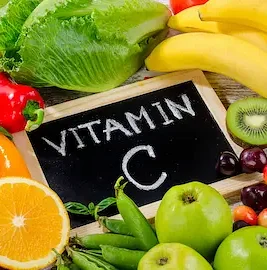Vitamin C – Health Benefits and Content in Foods
Содержимое
Discover the health benefits of vitamin C and learn which foods are rich in this essential nutrient. Find out how vitamin C can help boost your immune system, promote collagen production, and improve overall health.
Vitamin C, also known as ascorbic acid, is a vital nutrient for our overall health and well-being. It is an essential vitamin that our bodies cannot produce on their own, so it is important to include it in our diet. Vitamin C plays a crucial role in various bodily functions, such as collagen synthesis, iron absorption, and immune system support.
One of the key benefits of vitamin C is its powerful antioxidant properties. Antioxidants help protect our cells from damage caused by free radicals, which are unstable molecules that can lead to chronic diseases and accelerate the aging process. By consuming foods rich in vitamin C, we can boost our antioxidant defenses and reduce the risk of developing conditions such as heart disease, cancer, and arthritis.
Moreover, vitamin C is known for its immune-boosting abilities. It stimulates the production of white blood cells, which are essential for fighting off infections and diseases. Vitamin C also enhances the function of antibodies and supports the overall health of our immune system. Regular intake of vitamin C can help reduce the duration and severity of common colds and flu.
To ensure an adequate intake of vitamin C, it is important to include a variety of fruits and vegetables in our diet. Citrus fruits like oranges, lemons, and grapefruits are excellent sources of vitamin C. Other rich sources include kiwi, strawberries, papaya, and pineapple. Vegetables like bell peppers, broccoli, Brussels sprouts, and kale are also high in vitamin C. Including these foods in our meals can help us meet our daily requirements and enjoy the numerous health benefits of vitamin C.
Overview of Vitamin C
Vitamin C, also known as ascorbic acid, is a water-soluble vitamin that is essential for various bodily functions. It plays a vital role in supporting the immune system, promoting wound healing, and maintaining healthy skin, bones, and teeth.
Being an antioxidant, vitamin C helps protect cells from damage caused by harmful free radicals. It also aids in the production of collagen, a protein that is essential for the health and maintenance of connective tissues, such as tendons, ligaments, and blood vessels.
Moreover, vitamin C enhances the absorption of iron from plant-based sources, which is vital for the production of red blood cells and preventing iron deficiency anemia. It also acts as a cofactor in several enzymatic reactions in the body.
Although the human body does not have the ability to produce vitamin C on its own, it can be obtained through a balanced diet that includes fruits and vegetables. Citrus fruits, such as oranges and grapefruits, are particularly rich in vitamin C. Other excellent sources include strawberries, kiwis, bell peppers, broccoli, and spinach.
While the recommended daily intake of vitamin C varies depending on age, gender, and life stage, it is generally recommended to consume at least 75-90 mg per day for adults. However, higher doses may be required in certain situations, such as during pregnancy, breastfeeding, or when recovering from an illness.
In conclusion, vitamin C is a crucial nutrient that offers several health benefits. Including a variety of vitamin C-rich foods in your diet can help ensure that your body gets an adequate amount of this essential vitamin.
What is Vitamin C
Vitamin C, also known as ascorbic acid, is a water-soluble vitamin that is essential for the growth, development, and repair of body tissues. It is a powerful antioxidant that helps protect the body against free radicals, which are unstable molecules that can cause damage to cells.
Vitamin C plays a crucial role in the immune system, helping to strengthen the body’s natural defense mechanisms and fight off infections. It also plays a role in the production of collagen, a protein that is important for maintaining healthy skin, bones, and blood vessels.
In addition to its antioxidant and immune-boosting properties, vitamin C also helps the body absorb iron from plant-based sources, such as beans and leafy green vegetables. It is also involved in the synthesis of certain neurotransmitters, including dopamine and norepinephrine, which are important for brain function and mood regulation.
While vitamin C is found in a variety of fruits and vegetables, it is particularly abundant in citrus fruits, such as oranges and grapefruits. Other good sources of vitamin C include strawberries, kiwi, bell peppers, broccoli, and spinach.
It is important to note that vitamin C is a water-soluble vitamin, which means that it is not stored in the body and needs to be consumed on a regular basis. The recommended daily intake of vitamin C for adults is 75-90 milligrams, although higher doses may be needed for certain individuals, such as smokers or individuals with certain medical conditions.
In conclusion, vitamin C is an essential nutrient that plays a vital role in maintaining overall health and well-being. Incorporating vitamin C-rich foods into your diet can help support a strong immune system, promote healthy skin and bones, and contribute to optimal brain function.
Health Benefits of Vitamin C

Vitamin C, also known as ascorbic acid, is a water-soluble vitamin that is essential for the growth, development, and repair of body tissues. It plays a crucial role in many biological functions and offers a wide range of health benefits.
One of the main benefits of vitamin C is its potent antioxidant properties. It helps to protect cells from damage caused by free radicals and oxidative stress, which can lead to various chronic diseases such as heart disease and cancer.
Vitamin C is also involved in the production of collagen, a protein that helps to strengthen the skin, bones, and connective tissues. It promotes wound healing and helps to maintain healthy skin, hair, and nails.
In addition, vitamin C boosts the immune system by stimulating the production of white blood cells, which are responsible for fighting off infections and diseases. It can help to reduce the duration and severity of common cold symptoms.
Furthermore, vitamin C has been shown to reduce the risk of chronic diseases such as heart disease, high blood pressure, and stroke. It helps to lower blood pressure levels and improve blood vessel function.
Another benefit of vitamin C is its ability to enhance the absorption of iron from plant-based foods. It can help to prevent iron deficiency anemia, a condition characterized by low levels of red blood cells and fatigue.
Moreover, vitamin C is a powerful natural detoxifier that helps to eliminate toxins from the body. It supports liver function and aids in the detoxification process.
Some studies have suggested that vitamin C may have a protective effect against certain types of cancer, including lung, breast, and colon cancer. It can help to reduce the risk of cancer by preventing DNA damage and inhibiting the growth of cancer cells.
In conclusion, vitamin C is a vital nutrient that offers numerous health benefits. It is important to include vitamin C-rich foods in your diet to maintain optimal health and well-being.
| Oranges | 53.2 |
| Strawberries | 59 |
| Kiwi | 92.7 |
| Red bell peppers | 128 |
| Broccoli | 89.2 |
Risk Factors for Vitamin C Deficiency
Vitamin C deficiency can occur in individuals who have certain risk factors and lifestyle choices that may contribute to low levels of this essential nutrient. Some of the common risk factors for vitamin C deficiency include:
| Poor Diet | A diet that lacks fruits and vegetables, which are the primary sources of vitamin C, can increase the risk of deficiency. |
| Smoking | Smokers have higher vitamin C requirements as smoking increases oxidative stress and depletes vitamin C levels in the body. |
| Alcoholism | Excessive alcohol consumption can interfere with the absorption and utilization of vitamin C, leading to deficiency. |
| Malabsorption Disorders | Conditions such as celiac disease, Crohn’s disease, and gastrointestinal surgeries can impair the absorption of vitamin C. |
| Stress | Chronic stress can increase the body’s demand for vitamin C, depleting the available stores and increasing the risk of deficiency. |
| Certain Medications | Some medications, such as certain antibiotics and antacids, can interfere with the absorption or utilization of vitamin C. |
| Pregnancy and Breastfeeding | During pregnancy and breastfeeding, the demand for vitamin C increases, and deficiency can occur if dietary intake is insufficient. |
It is important for individuals with these risk factors to be mindful of their vitamin C intake and consider incorporating more vitamin C-rich foods into their diet or taking supplements under the guidance of a healthcare professional.
Rich Sources of Vitamin C in Foods

Vitamin C is an essential nutrient that plays a crucial role in maintaining the health of our body. It is known for its powerful antioxidant properties and its ability to boost the immune system. Here are some rich sources of vitamin C in foods:
1. Citrus Fruits: Citrus fruits such as oranges, lemons, grapefruits, and limes are well-known for their high vitamin C content. Just one medium-sized orange can provide you with more than 70% of your daily recommended intake of vitamin C.
2. Berries: Berries like strawberries, blueberries, raspberries, and blackberries are packed with vitamin C. They are not only delicious but are also a great addition to your diet for boosting your vitamin C levels.
3. Kiwi: Kiwi is a tropical fruit that is rich in vitamin C. It also contains other important nutrients like vitamin K, vitamin E, and potassium. Adding kiwi to your diet can provide you with a good amount of vitamin C.
4. Bell Peppers: Bell peppers, especially the red ones, are an excellent source of vitamin C. They are also rich in other antioxidants, making them a great addition to your meals.
5. Papaya: Papaya is a tropical fruit that is not only delicious but also packed with vitamin C. It is a great fruit to add to your diet if you want to increase your vitamin C intake.
6. Guava: Guava is another tropical fruit that is rich in vitamin C. It is also a good source of dietary fiber and other essential nutrients. Adding guava to your diet can provide you with a good amount of vitamin C.
7. Leafy Greens: Leafy greens like spinach, kale, and Swiss chard are not only rich in iron but also in vitamin C. They are a great addition to your diet for a healthy dose of vitamin C.
8. Tomatoes: Tomatoes are not only a great source of vitamin C but also an excellent source of other important nutrients like lycopene. They are a versatile ingredient that can be added to various dishes.
9. Mango: Mangoes are not only delicious but also packed with vitamin C. They are a great addition to your diet if you want to increase your vitamin C intake.
10. Pineapple: Pineapple is a tropical fruit that is not only sweet and delicious but also packed with vitamin C. It is a great fruit to add to your diet for a healthy dose of vitamin C.
Including these rich sources of vitamin C in your diet can help ensure that you meet your daily recommended intake of this essential nutrient. Remember to consume a variety of fruits and vegetables to get a wide range of nutrients.